(期末考点培优)专题07 句型转换-2024-2025学年八年级英语下册期末复习考点培优专项牛津上海版(试用本)(含答案解析)
文档属性
| 名称 | (期末考点培优)专题07 句型转换-2024-2025学年八年级英语下册期末复习考点培优专项牛津上海版(试用本)(含答案解析) |
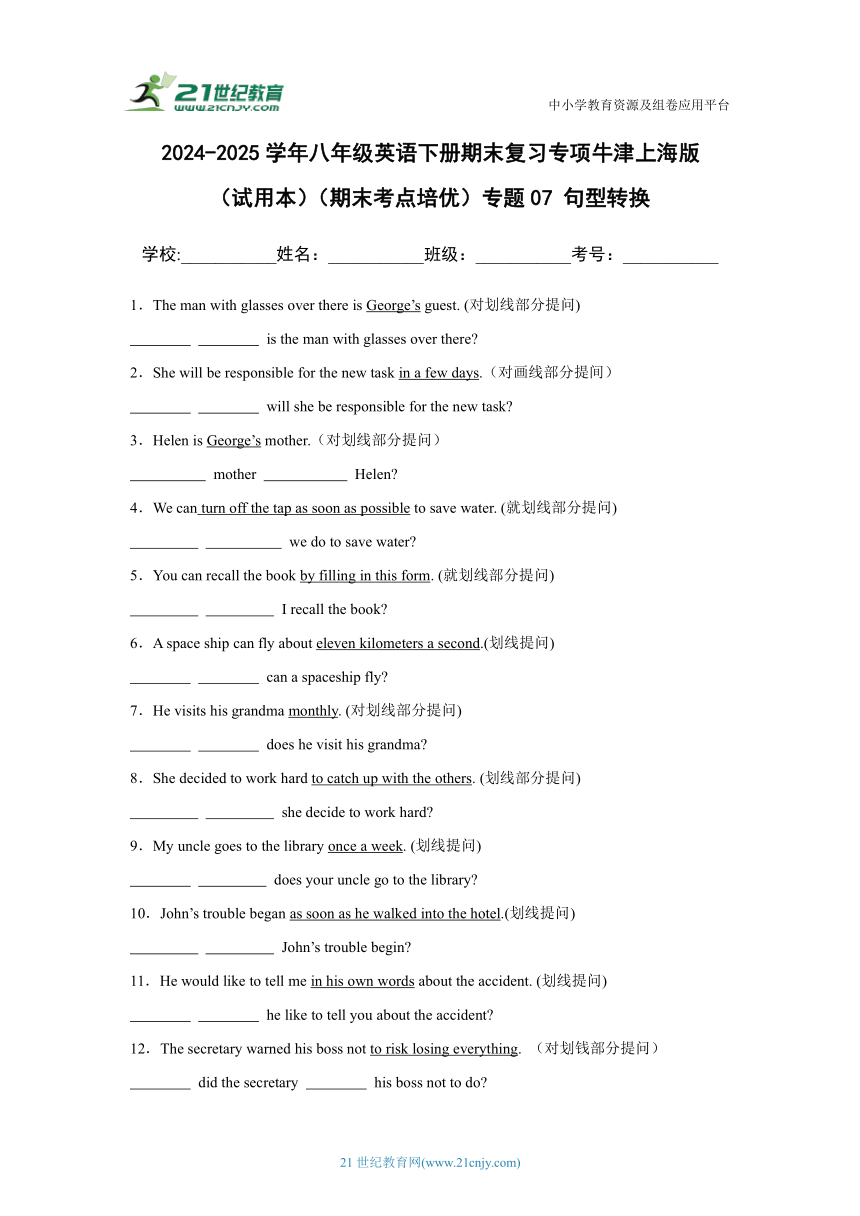
|
|
| 格式 | docx | ||
| 文件大小 | 65.3KB | ||
| 资源类型 | 试卷 | ||
| 版本资源 | 牛津上海版(试用本) | ||
| 科目 | 英语 | ||
| 更新时间 | 2025-05-31 20:14:39 | ||
图片预览

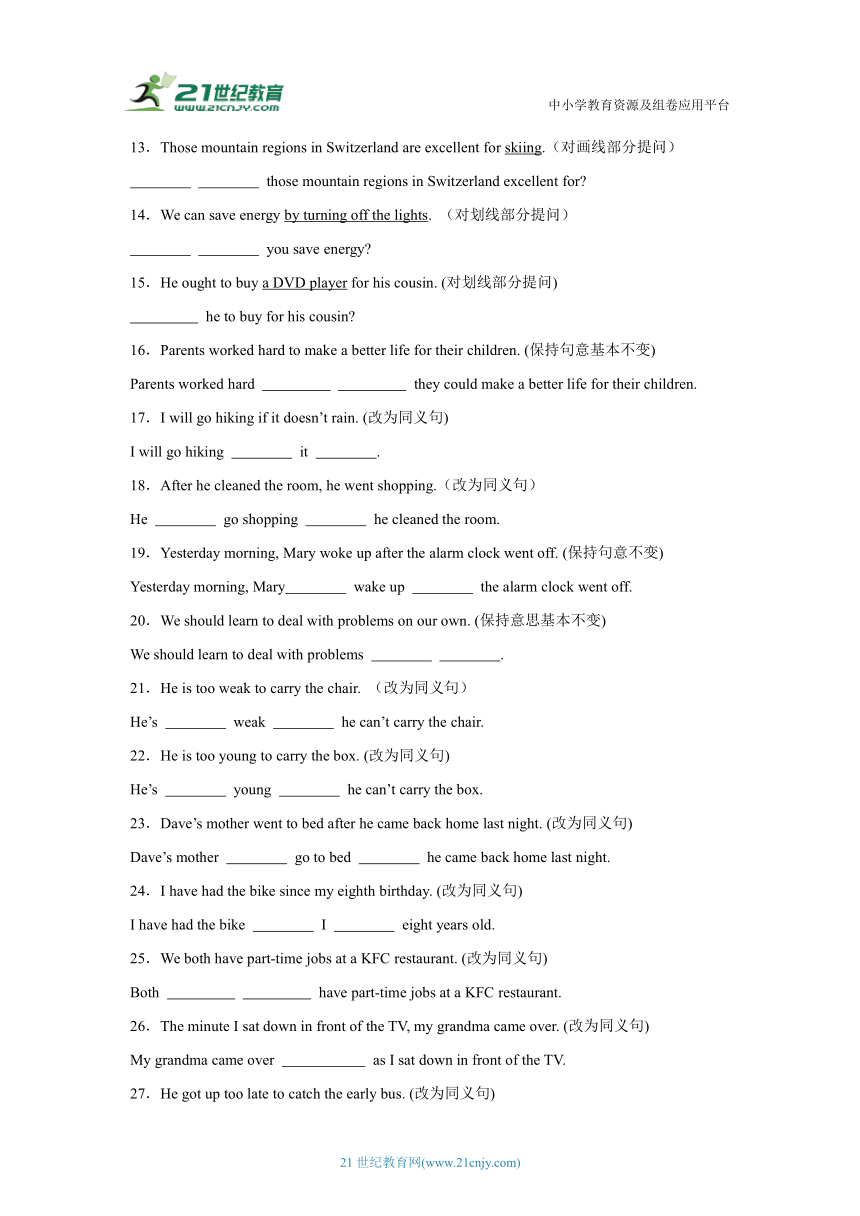
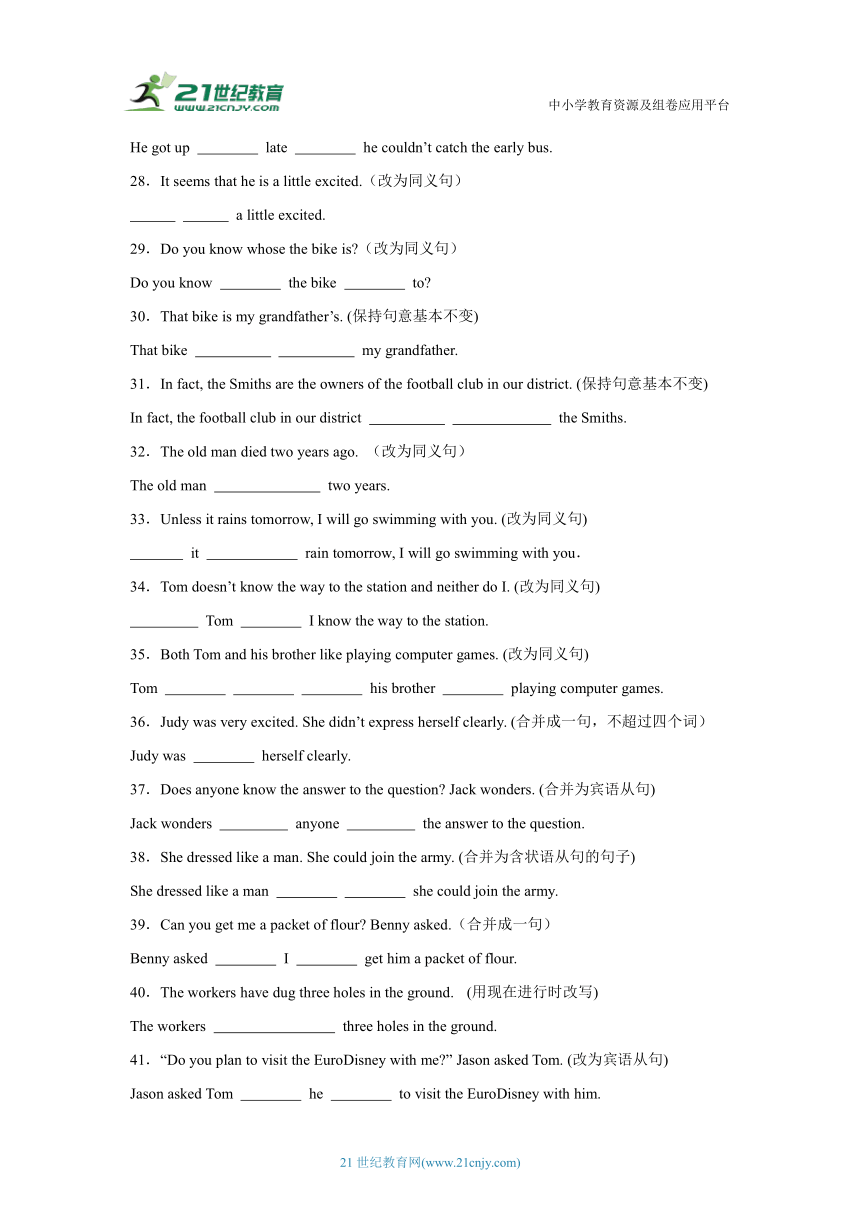
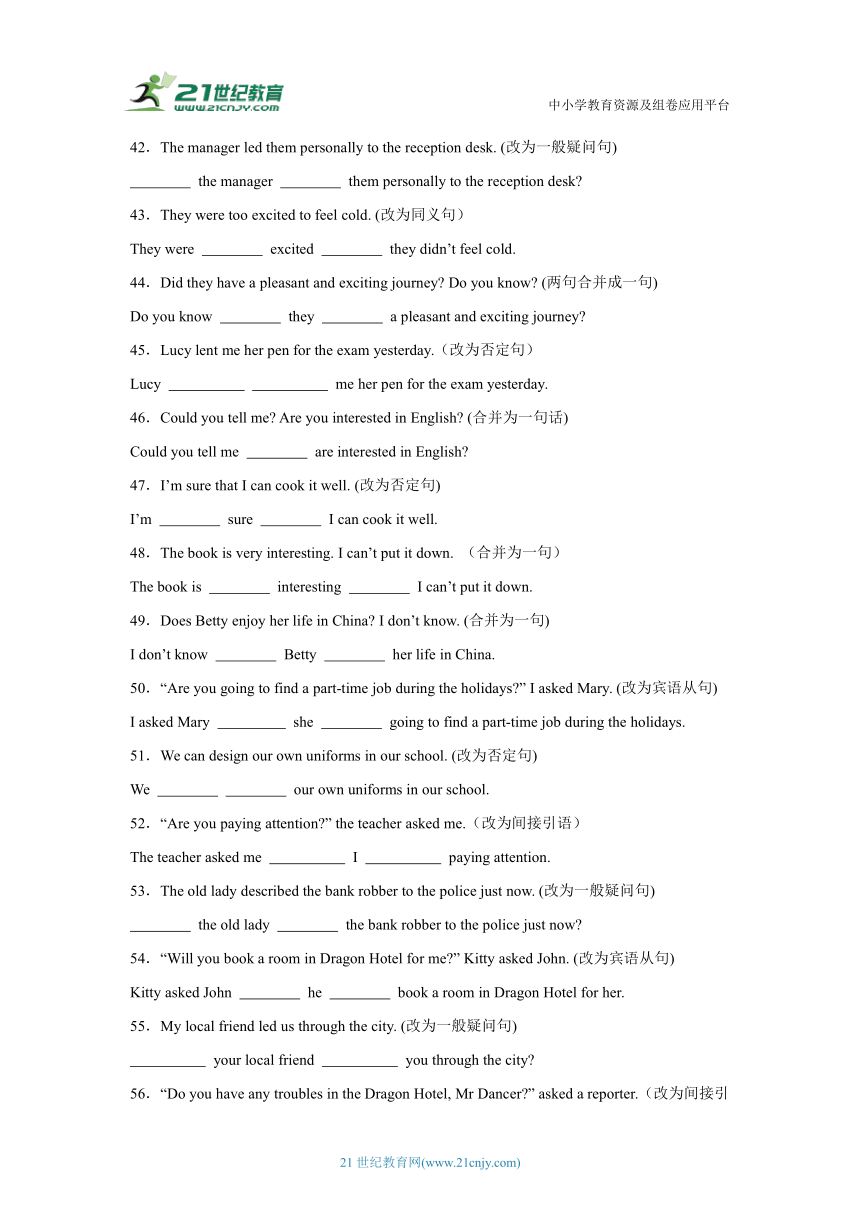
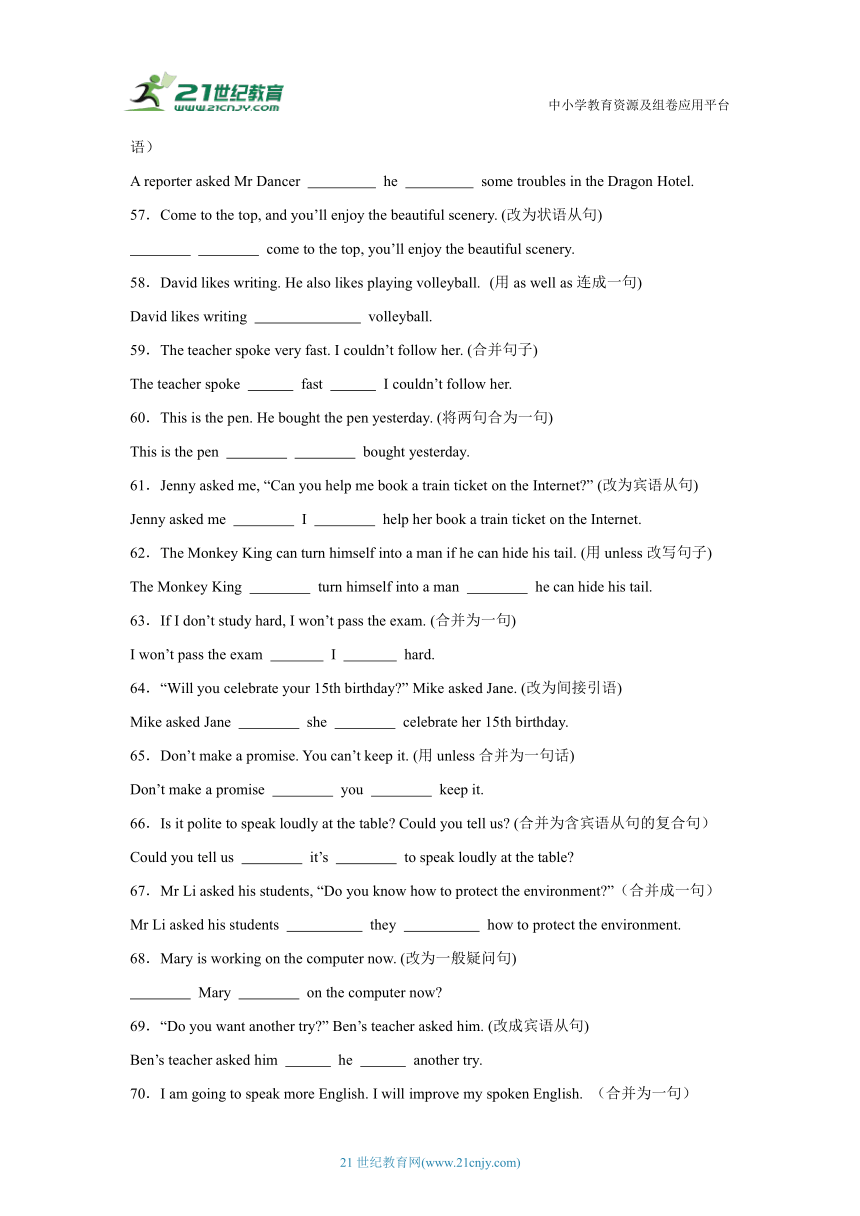
文档简介
中小学教育资源及组卷应用平台
中小学教育资源及组卷应用平台
2024-2025学年八年级英语下册期末复习专项牛津上海版
(试用本)(期末考点培优)专题07 句型转换
学校:___________姓名:___________班级:___________考号:___________
1.The man with glasses over there is George’s guest. (对划线部分提问)
is the man with glasses over there
2.She will be responsible for the new task in a few days.(对画线部分提间)
will she be responsible for the new task
3.Helen is George’s mother.(对划线部分提问)
mother Helen
4.We can turn off the tap as soon as possible to save water. (就划线部分提问)
we do to save water
5.You can recall the book by filling in this form. (就划线部分提问)
I recall the book
6.A space ship can fly about eleven kilometers a second.(划线提问)
can a spaceship fly
7.He visits his grandma monthly. (对划线部分提问)
does he visit his grandma
8.She decided to work hard to catch up with the others. (划线部分提问)
she decide to work hard
9.My uncle goes to the library once a week. (划线提问)
does your uncle go to the library
10.John’s trouble began as soon as he walked into the hotel.(划线提问)
John’s trouble begin
11.He would like to tell me in his own words about the accident. (划线提问)
he like to tell you about the accident
12.The secretary warned his boss not to risk losing everything. (对划钱部分提问)
did the secretary his boss not to do
13.Those mountain regions in Switzerland are excellent for skiing.(对画线部分提问)
those mountain regions in Switzerland excellent for
14.We can save energy by turning off the lights. (对划线部分提问)
you save energy
15.He ought to buy a DVD player for his cousin. (对划线部分提问)
he to buy for his cousin
16.Parents worked hard to make a better life for their children. (保持句意基本不变)
Parents worked hard they could make a better life for their children.
17.I will go hiking if it doesn’t rain. (改为同义句)
I will go hiking it .
18.After he cleaned the room, he went shopping.(改为同义句)
He go shopping he cleaned the room.
19.Yesterday morning, Mary woke up after the alarm clock went off. (保持句意不变)
Yesterday morning, Mary wake up the alarm clock went off.
20.We should learn to deal with problems on our own. (保持意思基本不变)
We should learn to deal with problems .
21.He is too weak to carry the chair. (改为同义句)
He’s weak he can’t carry the chair.
22.He is too young to carry the box. (改为同义句)
He’s young he can’t carry the box.
23.Dave’s mother went to bed after he came back home last night. (改为同义句)
Dave’s mother go to bed he came back home last night.
24.I have had the bike since my eighth birthday. (改为同义句)
I have had the bike I eight years old.
25.We both have part-time jobs at a KFC restaurant. (改为同义句)
Both have part-time jobs at a KFC restaurant.
26.The minute I sat down in front of the TV, my grandma came over. (改为同义句)
My grandma came over as I sat down in front of the TV.
27.He got up too late to catch the early bus. (改为同义句)
He got up late he couldn’t catch the early bus.
28.It seems that he is a little excited.(改为同义句)
a little excited.
29.Do you know whose the bike is (改为同义句)
Do you know the bike to
30.That bike is my grandfather’s. (保持句意基本不变)
That bike my grandfather.
31.In fact, the Smiths are the owners of the football club in our district. (保持句意基本不变)
In fact, the football club in our district the Smiths.
32.The old man died two years ago. (改为同义句)
The old man two years.
33.Unless it rains tomorrow, I will go swimming with you. (改为同义句)
it rain tomorrow, I will go swimming with you.
34.Tom doesn’t know the way to the station and neither do I. (改为同义句)
Tom I know the way to the station.
35.Both Tom and his brother like playing computer games. (改为同义句)
Tom his brother playing computer games.
36.Judy was very excited. She didn’t express herself clearly. (合并成一句,不超过四个词)
Judy was herself clearly.
37.Does anyone know the answer to the question Jack wonders. (合并为宾语从句)
Jack wonders anyone the answer to the question.
38.She dressed like a man. She could join the army. (合并为含状语从句的句子)
She dressed like a man she could join the army.
39.Can you get me a packet of flour Benny asked.(合并成一句)
Benny asked I get him a packet of flour.
40.The workers have dug three holes in the ground. (用现在进行时改写)
The workers three holes in the ground.
41.“Do you plan to visit the EuroDisney with me ” Jason asked Tom. (改为宾语从句)
Jason asked Tom he to visit the EuroDisney with him.
42.The manager led them personally to the reception desk. (改为一般疑问句)
the manager them personally to the reception desk
43.They were too excited to feel cold. (改为同义句)
They were excited they didn’t feel cold.
44.Did they have a pleasant and exciting journey Do you know (两句合并成一句)
Do you know they a pleasant and exciting journey
45.Lucy lent me her pen for the exam yesterday.(改为否定句)
Lucy me her pen for the exam yesterday.
46.Could you tell me Are you interested in English (合并为一句话)
Could you tell me are interested in English
47.I’m sure that I can cook it well. (改为否定句)
I’m sure I can cook it well.
48.The book is very interesting. I can’t put it down. (合并为一句)
The book is interesting I can’t put it down.
49.Does Betty enjoy her life in China I don’t know. (合并为一句)
I don’t know Betty her life in China.
50.“Are you going to find a part-time job during the holidays ” I asked Mary. (改为宾语从句)
I asked Mary she going to find a part-time job during the holidays.
51.We can design our own uniforms in our school. (改为否定句)
We our own uniforms in our school.
52.“Are you paying attention ” the teacher asked me.(改为间接引语)
The teacher asked me I paying attention.
53.The old lady described the bank robber to the police just now. (改为一般疑问句)
the old lady the bank robber to the police just now
54.“Will you book a room in Dragon Hotel for me ” Kitty asked John. (改为宾语从句)
Kitty asked John he book a room in Dragon Hotel for her.
55.My local friend led us through the city. (改为一般疑问句)
your local friend you through the city
56.“Do you have any troubles in the Dragon Hotel, Mr Dancer ” asked a reporter.(改为间接引语)
A reporter asked Mr Dancer he some troubles in the Dragon Hotel.
57.Come to the top, and you’ll enjoy the beautiful scenery. (改为状语从句)
come to the top, you’ll enjoy the beautiful scenery.
58.David likes writing. He also likes playing volleyball. (用as well as连成一句)
David likes writing volleyball.
59.The teacher spoke very fast. I couldn’t follow her. (合并句子)
The teacher spoke fast I couldn’t follow her.
60.This is the pen. He bought the pen yesterday. (将两句合为一句)
This is the pen bought yesterday.
61.Jenny asked me, “Can you help me book a train ticket on the Internet ” (改为宾语从句)
Jenny asked me I help her book a train ticket on the Internet.
62.The Monkey King can turn himself into a man if he can hide his tail. (用unless改写句子)
The Monkey King turn himself into a man he can hide his tail.
63.If I don’t study hard, I won’t pass the exam. (合并为一句)
I won’t pass the exam I hard.
64.“Will you celebrate your 15th birthday ” Mike asked Jane. (改为间接引语)
Mike asked Jane she celebrate her 15th birthday.
65.Don’t make a promise. You can’t keep it. (用unless合并为一句话)
Don’t make a promise you keep it.
66.Is it polite to speak loudly at the table Could you tell us (合并为含宾语从句的复合句)
Could you tell us it’s to speak loudly at the table
67.Mr Li asked his students, “Do you know how to protect the environment ”(合并成一句)
Mr Li asked his students they how to protect the environment.
68.Mary is working on the computer now. (改为一般疑问句)
Mary on the computer now
69.“Do you want another try ” Ben’s teacher asked him. (改成宾语从句)
Ben’s teacher asked him he another try.
70.I am going to speak more English. I will improve my spoken English. (合并为一句)
I more English, I will improve my spoken English.
71.Does he need to come early tomorrow Tom wants to know. (改为宾语从句)
Tom wants to know he to come early tomorrow.
72.Come here, and you’ll have a good time. (改为条件状语从句)
come here, you’ll have a good time.
73.My mother finished the housework. She went to sleep. (合并为一句).
My mother go to sleep she finished the housework.
74.Mr. Chen is very busy, but he exercises every day. (合并为复合句)
Mr. Chen is very busy, he exercises every day.
75.I can’t do the work by myself. He helps me.(合并为一句)
If I can’t do the work by myself, he me.
76.“How can I get to the nearest hospital ” the man asked.(连接成宾语从句)
The man asked how get to the nearest hospital.
77.It’s impossible for him to finish the work alone. (改为反意疑问句)
It’s impossible for him to finish the work alone,
78.Mr Black put the naughty boy in detention the day before yesterday.(否定句)
Mr Black the naughty boy in detention the day before yesterday.
79.You go to the party. You have a good time.(改为条件状语从句)
you go to the party, you have a good time.
80.“Does water cover most of the Earth’s surface ” asked the boy. (改为宾语从句)
The boy wanted to know water most of the Earth’s surface or not.
中小学教育资源及组卷应用平台
中小学教育资源及组卷应用平台
21世纪教育网(www.21cnjy.com)
21世纪教育网(www.21cnjy.com)
参考答案及试题解析
1.Whose guest
【解析】句意:那边戴眼镜的那个人是乔治的客人。根据划线部分可知,此处应询问是谁的客人,因此用特殊疑问词whose“谁的”位于句首,后接名词guest“客人”。故填Whose;guest。
2.How soon
【解析】句意:她将在几天后负责这项新任务。划线部分in a few days为时间状语,表示“几天后”,疑问句应用how soon“多久以后”来提问。故填How;soon。
3.Whose is
【解析】句意:海伦是乔治的母亲。划线部分是“George’s”,问“谁的”用疑问词whose,be动词is提至Helen前,故填Whose;is。
4.What can
【解析】句意:为了节约用水,我们可以尽可能地关闭水龙头。划线部分为所做的事情,对其提问应该选择疑问词what,后加一般疑问句,句首单词首字母要大写。故填What;can。
5.How can
【解析】句意:你可以通过填写这张表格回忆这本书。就划线部分的方式状语提问,用疑问词how,特殊疑问句中情态动词can置于主语之前。故填How;can。
6.How fast
【解析】句意:太空船每秒可飞行约11公里。划线部分表速度,对其提问应用how fast,表“多么快”,句首首字母大写。故填How;fast。
7.How often
【解析】句意:他每月去看望他的奶奶。划线部分“monthly”意为“每个月,每月一次”,表示频率,对其提问用how often。故填How;often。
8.Why did
【解析】句意:她决定努力学习以赶上其他人。划线部分表示目的,对此提问用疑问词why,decided是动词过去式,疑问句借助于助动词did,故填Why;did。
9.How often
【解析】句意:我的叔叔每周去一次图书馆。“once a week”是每周去图书馆的频率,对频率提问应用how often“多久一次”,句首首字母应大写。故填How;often。
10.When did
【解析】句意:约翰一走进旅馆,麻烦就开始了。根据划线部分“as soon as he walked into the hotel”可知,此处应是问“麻烦什么时候开始”,应用when提问,原句是一般过去时,此处应用助动词did,故填When;did。
11.How would
【解析】句意:他想亲口把事故的经过告诉我。根据划线部分“in his own words”可知,此处应问“他想怎样告诉你”,应用how提问,疑问句把would提到主语前,故填How;would。
12.What warn
【解析】句意:秘书警告他的老板不要冒失去一切的风险。根据要求是对划线部分提问,且划线部分为“某事”,所以特殊疑问词应该使用“what”,位于句首,首字母应该大写,其余部分应该改为一般疑问句,“did”提前,“warned”改为原形。故填What;warn。
13.What are
【解析】句意:瑞士的那些山区非常适合滑雪。画线部分skiing在此表示用途,应用what来提问,位于句首,首字母要大写,后接谓语动词are。故填What;are。
14.How can
【解析】句意:我们可以通过关灯来节省能源。划线部分为方式,故应用特殊疑问词“how”来提问,句首首字母大写;结合原句“We can save energy”可知,这里仍然用情态动词“can”。故填How;can。
15.What ought
【解析】句意:他应该给他表弟买一台DVD播放机。根据题干可知,划线部分“a DVD player”一台DVD播放机,是对物进行提问,需用疑问词what,后跟一般疑问句,需把情态动词“ought”提前。故填What ought。
16.so that
【解析】句意:父母努力工作,为他们的孩子创造更好的生活。改为同义句,可将原句中表目的的不定式短语“to make a better life”转换为so that引导的目的状语从句,表示“为了”。故填so;that。
17.unless rains
【解析】句意:如果不下雨,我就去远足。if...not...=unless表示“如果不,除非”,unless和if引导的条件状语从句用一般现在时,故第一空为unless,第二空为rains。故填unless;rains。
18.didn’t until
【解析】句意:打扫完房间后,他就去购物了。原句“After he cleaned the room, he went shopping.”表示“他打扫完房间后去购物”。改写为同义句,将“after”引导的时间状语从句转换为“not…until”结构(意为“直到……才……”)。“didn’t go shopping until he cleaned the room”表示“直到他打扫完房间才去购物”,与原句的“after”时间关系一致。故填didn’t;until。
19.didn’t until
【解析】句意:昨天早上,闹钟响后玛丽醒了。 原句表达闹钟响后玛丽醒来,“not... until...”表示“直到……才……”,此句型可表达相同意思。对于第一个空,原句是一般过去时,变为否定句要借助助动词“didn’t”;对于第二个空,根据“not... until...”结构,这里应填“until”。故填didn’t;until。
20.by ourselves
【解析】句意:我们应该学会自己处理问题。根据“We should learn to deal with problems on our own.”可知,on our own表示“独自地;靠自己”。这里可用by oneself替换,表示“独自地;靠自己”,原句主语是we,对应的反身代词是ourselves,by ourselves符合语境。故填by;ourselves。
21.so that
【解析】句意:他太虚弱了,不能搬动椅子。too...to do sth“太……而不能做某事”,不定式作结果状语,分析修改后的句子可知,设空处可改为so…that“如此……以至……”,引导结果状语从句。故填so;that。
22.so that
【解析】句意:他太小了,不能搬动这个箱子。原句中含有短语too…to do sth.表示“太……而不能做某事”,结合“He’s…young…he can’t carry the box.”可知,可用短语so…that…“如此……以至于……”转换成结果状语从句,故填so;that。
23.didn’t until
【解析】句意:昨晚戴夫回家后,他妈妈就上床睡觉了。结合“go to bed”及从句“he came back home last night.”可知,该句也可表达为“戴夫的妈妈昨晚直到他回家才上床睡觉”,应用not…until“直到……才”句型,且该句时态为一般过去式,应用助动词did的否定形式构成否定句。故填didn’t;until。
24.since was
【解析】句意:我八岁生日时就有了这辆自行车。“since+过去一个时间点”,“since+从句”是since的两种用法,故可替换为“since+从句”;在since引导的时间状语从句中,主句为现在完成时,从句通常使用一般过去时,且主语为I,故be动词用was。故填since;was。
25.of us
【解析】句意:我们都在肯德基餐厅做兼职。表示“我们两个人”可以用We both,也可以用Both of us,两者可以互换。故填of;us。
26.as soon
【解析】句意:我坐在电视机前的那一刻,我奶奶就过来了。根据句意可知此处可用“一……就”表示,英文表达是as soon as,是时间状语从句的连词,故填as soon。
27.so that
【解析】句意:他起得太晚,赶不上早班车。too…to…“太……而不能……”。原句可用so…that…“如此……以至于……”替换,引导结果状语从句。故填so;that。
28.He seems
【解析】句意:他似乎有点兴奋。原句是It seems that...句型,结合空数可知,这里主语可以用he,seem作谓语动词,句子是一般现在时,主语是第三人称单数,动词用三单形式。故填He;seems。
29.who belongs
【解析】句意:你知道自行车是谁的吗?此处可改为“你知道自行车属于谁吗”,用who引导宾语从句,belong to“属于”,句子用一般现在时,主语是名词单数,谓语动词用单三。故填who;belongs。
30.belongs to
【解析】句意:那辆自行车是我祖父的。分析句子,设空处可以用短语belong to“属于”表示,该句陈述事实,为一般现在时,主语是“That bike”,动词填三单形式。故填belongs;to。
31.belongs to
【解析】句意:事实上,史密斯一家是我们地区足球俱乐部的老板。根据题意可知,此处可以表达为“我们区的足球俱乐部属于史密斯一家”,句子时态是一般现在时,属于:belong to,固定词组,主语是the football club,谓语动词用单数第三人称belongs。故填belongs;to。
32.has been dead for
【解析】句意:这位老人两年前去世了。根据“The old man...two years”可知,此处可表示为“这位老人已经去世两年了”,此时需要用现在完成时,动词die是一个瞬间动词, 不可以和“for+时间段”连用,因此要改为be dead,且主语是第三人称单数,因此用has been dead,最后的时间状语是for two years。故填has been dead for。
33.If doesn’t
【解析】句意:除非明天下雨,否则我将和你一起去游泳。unless“如果不,除非”可以和if…not进行同义句转换,主句用一般将来时,从句用一般现在时,从句主语为it为第三人称单数,助动词用doesn’t。故填If ;doesn’t。
34.Neither nor
【解析】句意:汤姆不知道去车站的路,我也不知道。根据“Tom doesn’t know the way to the station and neither do I.”可知,汤姆和我都不知道去车站的路;neither…nor表示“既不……也不……”,连接并列主语。故填Neither;nor。
35.as well as likes
【解析】句意:汤姆和他的哥哥都喜欢玩电脑游戏。both...and...“……和……都”,可替换成as well as表示“和”,连接两个并列主语的时候,谓语动词遵循“就远原则”,即谓语动词和Tom保持一致;Tom是单数第三人称,所以动词like用三单形式。故填as;well;as; likes。
36.too excited to express
【解析】句意:朱迪很兴奋。她没有清楚地表达自己。此处可以同义转换为简单句的固定句型“too+adj/adv+to do sth”,意为“太……而不能做某事”。故填too excited to express。
37.whether/if knows
【解析】句意:有人知道这个问题的答案吗?杰克想知道。Jack wonders后跟宾语从句,因为Does anyone know the answer to the question 是一般疑问句,所以连接词用if/whether“是否”,语序用陈述句语序,时态用一般现在时。从句主语是anyone,谓语动词用第三人称单数。故填whether/if;knows。
38.so that
【解析】句意:她打扮得像个男人。她可以参军。此处可以表达为“她打扮得像个男人为了她能参军”,用so that引导的目的状语从句,表示“以便;为了”,故填so;that。
39.if/whether could
【解析】句意:你能给我拿包面粉吗?Benny问。原句为直接引语,合并为一句,可将直接引语变为间接引语,Benny asked后面接宾语从句,需用连词if/whether“是否”引导,且从句为陈述语序,根据asked可知,时态为一般过去时,谓语动词用过去式could。故填if/whether;could。
40.are digging
【解析】句意:工人们已经在地面上挖出三个洞了。根据题目要求改成现在进行时,根据主语是复数,故be动词应用are,dig的现在分词形式为digging。故填are digging。
41.if/whether planned
【解析】句意:“你打算和我一起去欧洲迪斯尼乐园吗?”杰森问汤姆。分析题干,变含有一般疑问句的两个句子为宾语从句的复合句时,应用if或whether引导宾语从句,意为“是否……”,则第一空用if或whether;后接陈述句语序,其时态应与主句的一般过去时一致,则第二空处应用plan的过去式作谓语。故填if/whether;planned。
42.Did lead
【解析】句意:经理亲自领他们到接待处。原句时态为一般过去时,改为一般疑问句需要借助助动词did,后跟动词原形lead“带领”。故填Did;lead。
43.so that
【解析】句意:他们太兴奋了,感觉不到冷。原句too...to...结构可以用so...that...“如此……以致于”来进行同义替换。其中so后接形容词或副词。故填so;that。
44.if/whether had
【解析】句意:他们的旅程愉快又有趣吗?你知道吗?根据“Do you know…they…a pleasant and exciting journey ”及汉语提示可知,需要将两个一般疑问句改为宾语从句,连接词应用if/whether“是否”;根据宾语从句的时态规则,主句是一般现在时,从句时态不受限制。根据原句可知,从句时态用一般过去时。故填if/whether;had。
45.didn’t lend
【解析】句意:露西昨天把她的钢笔借给我考试用。根据时间状语“yesterday”可知,句子时态为一般过去时,改为否定句需要使用助动词didn’t,后接动词原形lend。故填didn’t;lend。
46.if you /whether you
【解析】句意:你能告诉我吗?你对英语感兴趣吗?根据句子可知,此句是一般疑问句,变成宾语从句时应用if/whether引导,语序为陈述句语序。故填if you/whether you。
47.not whether
【解析】句意:我确定我能把它做好。分析句子,be sure相当于“确定”;否定形式be not sure表示“不确定”;这里是whether表示是否,引导的宾语从句。故填not;whether。
48.so that
【解析】句意:这本书如此有趣,我无法将它放下。分析句子逻辑关系可知,上一句是原因,后一句为结果,合并成一句需要借助连词so...that...“太……以至于……”,在此引导结果状语从句。故填so;that。
49.if/whether enjoys
【解析】句意:贝蒂喜欢她在中国的生活吗?我不知道。原句合并后可以构成一个含有宾语从句的主从复合句,表达的是“我不知道贝蒂是否喜欢她在中国的生活”,原句是一般疑问句,所以变成宾语从句用if/whether引导;主句为一般现在时,宾语从句也用一般现在时,且从句要用陈述语序;从句中,Betty作主语,谓语动词应用第三人称单数形式,应填enjoys。故填if/whether;enjoys。
50.if was
【解析】句意:我问玛丽:“你打算在假期找份兼职吗?”。根据题意可知,此处要求改为宾语从句,因此用if引导宾语从句,意为“是否”,从句中主语是she,此处用一般过去时,因此be动词用was。故填if;was。
51.can’t design
【解析】句意:我们可以在学校设计自己的校服。根据题意可知,此处要求改为否定句,应该在情态动词can后加not,表示否定,其缩写形式为can’t;design保持不变,用动词原形,意为“设计”。故填can’t;design。
52.if/whether was
【解析】句意:“你在专心吗?”老师问我。直接引语是一般疑问句,改为间接引语时引导词用if/whether;根据“asked”可知主句是过去时,故此处从句用一般过去时,主语是I,be动词用was。故填if/whether;was。
53.Did describe
【解析】句意:那位老太太刚才向警方描述了银行抢劫犯的情况。原句时态为一般过去时,且described为实义动词,故变一般疑问句应用助动词did,动词用原形describe。故填Did;describe。
54.if/whether would
【解析】句意:“你能帮我在龙宾馆订个房间吗?”基蒂问约翰。根据“Will you book a room in Dragon Hotel for me ”可知,从句要用if或whether引导,问是否能做某事;宾语从句用陈述语序,再由“asked”可知,主句为一般过去时,从句使用过去的某种时态,he后用情态动词will的过去式would。故填if/whether;would。
55.Did lead
【解析】句意:我当地的朋友领我们穿过城市。时态为一般过去时,有实义动词“led”,因此改为一般疑问句,需用助动词did,放于句首,后接动词原形lead。故填Did;lead。
56.whether had
【解析】句意:“丹瑟先生,你在巨龙酒店遇到什么麻烦了吗?”一名记者问道。一名记者问丹瑟先生,他是否在巨龙酒店遇到了一些麻烦。根据直接引语为特殊疑问句,变为间接引语时,仍用原来的疑问词引导,主句为一般过去时,间接引语也应用过去的某种时态,故has变为had,又结合“‘Do you have any troubles in the Dragon Hotel, Mr Dancer ’ asked a reporter.”和所给部分可知,此处应该用whether来连接从句,意为“是否”符合语境。故填whether;had。
57.If you
【解析】句意:到顶上来,你会欣赏到漂亮的风景。改为状语从句,可以把“Come to the top”作为后句的条件状语,用“if”引导条件状语从句,位于句首首字母需大写,因此第一空填“If”;“Come to the top”是祈使句,省略了主语“you”,因此第二空用主语“you”。故填If;you。
58.as well as playing
【解析】句意:大卫喜欢写作。他还喜欢打排球。合并为一句,可用as well as连接,表示“除……之外(也)”,as后用动名词形式,play的动名词为playing。故填as well as playing。
59.so that
【解析】句意:老师说得非常快。我跟不上她。将原句合并为一句话后,可用so...that...“如此……以致于……”,引导结果状语从句。故填so;that。
60.which/that he
【解析】句意:这是钢笔。他昨天买了这支钢笔。此处合为一句应用定语从句,先行词是pen,指物,且关系词在从句中作宾语,应用which或that引导;根据“He bought the pen”可知从句主语为he。故填which/that;he。
61.if/whether could
【解析】句意:珍妮问我:“你能帮我在网上订一张火车票吗?”根据主句时态是一般过去时,可知宾语从句时态需要用一般过去时,can变成could;本句宾语从句由一般疑问句充当,所以连接词用if或whether,故填if/whether;could。
62.can’t/cannot unless
【解析】句意:美猴王如果可以把尾巴藏起来,他才能把自己变成人。此处考查if和unless引导的条件状语从句的转换。if如果;unless除非。句意转换成“除非美猴王能把尾巴藏起来,否则他不能把自己变成一个人”。故填can’t/cannot;unless。
63.unless study
【解析】句意:如果我不努力学习,我就不会通过考试。根据“I won’t pass the exam ... I ... hard.”可知,此处应用unless“除非”引导条件状语从句,从句应用一般现在时,结合主语“I”可知,从句动词用原形,study“学习”。故填unless;study。
64.if/whether would
【解析】句意:“你会庆祝你的15岁生日吗?”迈克问简。根据题目要求可知,本题应改为间接引语,直接引语是一般疑问句,间接引语应用if或whether转述,表示“是否”;直接引语是一般将来时态,根据“Mike asked Jane”可知,变为间接引语要用过去将来时态,will的过去式是would。故填if/whether;would。
65.unless can
【解析】句意:不要做出承诺。你不能遵守它。根据题意和“Don’t make a promise. You can’t keep it.”可知,句子可以表示为“不要做出承诺,除非你能遵守它”,此处应用unless“除非”引导条件状语从句,故第一空填unless。根据“Don’t”可知,句子为一般现在时,“能够”can,故第二空填can。故填unless;can。
66.if polite
【解析】句意:吃饭时大声说话是礼貌的吗?你能告诉我们吗?第一句为一般疑问句,改成宾语从句的复合句时,需用if“是否”来引导,其后为陈述语序。 is为系动词,填形容词polite“礼貌的”作表语。故填if;polite。
67.if knew
【解析】句意:李先生问他的学生:“你知道如何保护环境吗?”根据语境可知,时态为一般过去时,结合当直接引语为“一般疑问句”时,可以变为由if引导的宾语从句。直接引语是一般现在时态,从句用一般过去时态。故填if;knew。
68.Is working
【解析】句意:玛丽现在正在用电脑工作。分析句子,该句是现在进行时,其一般疑问句结构为“be动词+主语+现在分词+其他”,主语为单数人名“Mary”,需将be动词is提前,动词填现在分词。故填Is;working。
69.if/whether wanted
【解析】句意:“你想再试一次吗?”本的老师问他。原句为一般疑问句,改为宾语从句时要用引导词if/whether“是否”;由主句中的“asked”可知,主句为一般过去时态,宾语从句的时态也要用过去时态,因此谓语动词应用过去式wanted。故填if/whether;wanted。
70.If speak
【解析】句意:我要多说英语。我将提高我的英语口语。根据题意可知,可以把这句话改成if引导的条件状语从句,即“如果我多说英语,我将提高我的英语口语”。所以第一个空填if,首字母要大写。if引导的条件状语从句遵循“主将从现”的原则,所以从句用一般现在时,主语I为第一人称,所以第二个空用动词原形speak。故填If;speak。
71.if/whether needs
【解析】句意:他明天需要早来吗?汤姆想知道。根据原句结构可知,原句第一句为一般疑问句且时态为一般现在时,改成宾语从句,需if/whether来引导,其后跟陈述句式,从句主语为he,谓语动词need需单三形式needs。故填if/whether;needs。
72.If you
【解析】句意:过来,你会玩得很开心的。根据要求改为条件状语从句,所以用if“如果”引导,同时由于上句是祈使句,所以条件状语从句的主语是you,同时主句用一般将来时,即will+动词原形。故填If;you。
73.didn’t until
【解析】句意:我妈妈完成了家务。她去睡觉了。即“我妈妈直到做完家务才去睡觉”,not ... until表示“直到……才”,引导时间状语从句;时态为一般过去时,故助动词用did,否定为didn’t。故填didn’t;until。
74.Although/Though
【解析】句意:陈先生很忙,但他每天都锻炼。“Mr. Chen is very busy”与“he exercises every day”是让步关系,用although或though引导让步状语从句,故填Although/Though。
75.will help
【解析】句意:我一个人做不了这项工作,他帮助我。根据观察和分析可知改写后的句子是一个主从复合句,含有if引导的条件状语从句。主句用一般将来时,从句使用一般现在时。因此空格处填will help。故填will help。
76.he could
【解析】句意:“我怎么才能到最近的医院?”男人问道。宾语从句为陈述语序,时态遵循“主过从必过”原则,the man用he指代,can改为过去式could,故填he;could。
77.isn’t it
【解析】句意:他独自完成工作是不可能的。根据反意疑问句“前肯后否”原则,附加问句用否定式;原句是一般现在时,主谓是it is,所以否定用“isn’t it”。故填isn’t;it。
78.didn’t put
【解析】句意:布莱克先生前天把这个顽皮的男孩扣留在学校。含有实义动词的肯定句变否定句,需借助助动词。原句谓语动词是put,结合主语是第三人称单数,推测出put为动词过去式,所以否定句借助助动词did,did not=didn’t,后接动词原形。故填didn’t;put。
79.If will
【解析】句意:你去派对。你玩得开心。题目要求改为条件状语从句,句子可表达为“如果你去派对,你将会玩得开心”。if“如果”,引导条件状语从句,遵循主将从现原则,will“将”后接动词原形。故填If;will。
80.whether covers
【解析】句意:“水覆盖了地球表面的大部分吗?”男孩问道。根据题干将原句合成一个宾语从句,作为know的宾语,一般疑问句Does water cover most of the Earth’s surface 作为宾语从句,一般疑句变为宾语从句一般要用if或者whether做引导词,后面紧跟主语谓语;又因为“water covers most of the Earth’s surface”是客观事实,故从句的时态不需要变化,仍然是一般现在时,主语为不可数名词water,所以应用cover的三单形式covers。这里后面有or not,因此宾语从句只能用whether引导。故填whether;covers。
21世纪教育网(www.21cnjy.com)
21世纪教育网(www.21cnjy.com)
中小学教育资源及组卷应用平台
2024-2025学年八年级英语下册期末复习专项牛津上海版
(试用本)(期末考点培优)专题07 句型转换
学校:___________姓名:___________班级:___________考号:___________
1.The man with glasses over there is George’s guest. (对划线部分提问)
is the man with glasses over there
2.She will be responsible for the new task in a few days.(对画线部分提间)
will she be responsible for the new task
3.Helen is George’s mother.(对划线部分提问)
mother Helen
4.We can turn off the tap as soon as possible to save water. (就划线部分提问)
we do to save water
5.You can recall the book by filling in this form. (就划线部分提问)
I recall the book
6.A space ship can fly about eleven kilometers a second.(划线提问)
can a spaceship fly
7.He visits his grandma monthly. (对划线部分提问)
does he visit his grandma
8.She decided to work hard to catch up with the others. (划线部分提问)
she decide to work hard
9.My uncle goes to the library once a week. (划线提问)
does your uncle go to the library
10.John’s trouble began as soon as he walked into the hotel.(划线提问)
John’s trouble begin
11.He would like to tell me in his own words about the accident. (划线提问)
he like to tell you about the accident
12.The secretary warned his boss not to risk losing everything. (对划钱部分提问)
did the secretary his boss not to do
13.Those mountain regions in Switzerland are excellent for skiing.(对画线部分提问)
those mountain regions in Switzerland excellent for
14.We can save energy by turning off the lights. (对划线部分提问)
you save energy
15.He ought to buy a DVD player for his cousin. (对划线部分提问)
he to buy for his cousin
16.Parents worked hard to make a better life for their children. (保持句意基本不变)
Parents worked hard they could make a better life for their children.
17.I will go hiking if it doesn’t rain. (改为同义句)
I will go hiking it .
18.After he cleaned the room, he went shopping.(改为同义句)
He go shopping he cleaned the room.
19.Yesterday morning, Mary woke up after the alarm clock went off. (保持句意不变)
Yesterday morning, Mary wake up the alarm clock went off.
20.We should learn to deal with problems on our own. (保持意思基本不变)
We should learn to deal with problems .
21.He is too weak to carry the chair. (改为同义句)
He’s weak he can’t carry the chair.
22.He is too young to carry the box. (改为同义句)
He’s young he can’t carry the box.
23.Dave’s mother went to bed after he came back home last night. (改为同义句)
Dave’s mother go to bed he came back home last night.
24.I have had the bike since my eighth birthday. (改为同义句)
I have had the bike I eight years old.
25.We both have part-time jobs at a KFC restaurant. (改为同义句)
Both have part-time jobs at a KFC restaurant.
26.The minute I sat down in front of the TV, my grandma came over. (改为同义句)
My grandma came over as I sat down in front of the TV.
27.He got up too late to catch the early bus. (改为同义句)
He got up late he couldn’t catch the early bus.
28.It seems that he is a little excited.(改为同义句)
a little excited.
29.Do you know whose the bike is (改为同义句)
Do you know the bike to
30.That bike is my grandfather’s. (保持句意基本不变)
That bike my grandfather.
31.In fact, the Smiths are the owners of the football club in our district. (保持句意基本不变)
In fact, the football club in our district the Smiths.
32.The old man died two years ago. (改为同义句)
The old man two years.
33.Unless it rains tomorrow, I will go swimming with you. (改为同义句)
it rain tomorrow, I will go swimming with you.
34.Tom doesn’t know the way to the station and neither do I. (改为同义句)
Tom I know the way to the station.
35.Both Tom and his brother like playing computer games. (改为同义句)
Tom his brother playing computer games.
36.Judy was very excited. She didn’t express herself clearly. (合并成一句,不超过四个词)
Judy was herself clearly.
37.Does anyone know the answer to the question Jack wonders. (合并为宾语从句)
Jack wonders anyone the answer to the question.
38.She dressed like a man. She could join the army. (合并为含状语从句的句子)
She dressed like a man she could join the army.
39.Can you get me a packet of flour Benny asked.(合并成一句)
Benny asked I get him a packet of flour.
40.The workers have dug three holes in the ground. (用现在进行时改写)
The workers three holes in the ground.
41.“Do you plan to visit the EuroDisney with me ” Jason asked Tom. (改为宾语从句)
Jason asked Tom he to visit the EuroDisney with him.
42.The manager led them personally to the reception desk. (改为一般疑问句)
the manager them personally to the reception desk
43.They were too excited to feel cold. (改为同义句)
They were excited they didn’t feel cold.
44.Did they have a pleasant and exciting journey Do you know (两句合并成一句)
Do you know they a pleasant and exciting journey
45.Lucy lent me her pen for the exam yesterday.(改为否定句)
Lucy me her pen for the exam yesterday.
46.Could you tell me Are you interested in English (合并为一句话)
Could you tell me are interested in English
47.I’m sure that I can cook it well. (改为否定句)
I’m sure I can cook it well.
48.The book is very interesting. I can’t put it down. (合并为一句)
The book is interesting I can’t put it down.
49.Does Betty enjoy her life in China I don’t know. (合并为一句)
I don’t know Betty her life in China.
50.“Are you going to find a part-time job during the holidays ” I asked Mary. (改为宾语从句)
I asked Mary she going to find a part-time job during the holidays.
51.We can design our own uniforms in our school. (改为否定句)
We our own uniforms in our school.
52.“Are you paying attention ” the teacher asked me.(改为间接引语)
The teacher asked me I paying attention.
53.The old lady described the bank robber to the police just now. (改为一般疑问句)
the old lady the bank robber to the police just now
54.“Will you book a room in Dragon Hotel for me ” Kitty asked John. (改为宾语从句)
Kitty asked John he book a room in Dragon Hotel for her.
55.My local friend led us through the city. (改为一般疑问句)
your local friend you through the city
56.“Do you have any troubles in the Dragon Hotel, Mr Dancer ” asked a reporter.(改为间接引语)
A reporter asked Mr Dancer he some troubles in the Dragon Hotel.
57.Come to the top, and you’ll enjoy the beautiful scenery. (改为状语从句)
come to the top, you’ll enjoy the beautiful scenery.
58.David likes writing. He also likes playing volleyball. (用as well as连成一句)
David likes writing volleyball.
59.The teacher spoke very fast. I couldn’t follow her. (合并句子)
The teacher spoke fast I couldn’t follow her.
60.This is the pen. He bought the pen yesterday. (将两句合为一句)
This is the pen bought yesterday.
61.Jenny asked me, “Can you help me book a train ticket on the Internet ” (改为宾语从句)
Jenny asked me I help her book a train ticket on the Internet.
62.The Monkey King can turn himself into a man if he can hide his tail. (用unless改写句子)
The Monkey King turn himself into a man he can hide his tail.
63.If I don’t study hard, I won’t pass the exam. (合并为一句)
I won’t pass the exam I hard.
64.“Will you celebrate your 15th birthday ” Mike asked Jane. (改为间接引语)
Mike asked Jane she celebrate her 15th birthday.
65.Don’t make a promise. You can’t keep it. (用unless合并为一句话)
Don’t make a promise you keep it.
66.Is it polite to speak loudly at the table Could you tell us (合并为含宾语从句的复合句)
Could you tell us it’s to speak loudly at the table
67.Mr Li asked his students, “Do you know how to protect the environment ”(合并成一句)
Mr Li asked his students they how to protect the environment.
68.Mary is working on the computer now. (改为一般疑问句)
Mary on the computer now
69.“Do you want another try ” Ben’s teacher asked him. (改成宾语从句)
Ben’s teacher asked him he another try.
70.I am going to speak more English. I will improve my spoken English. (合并为一句)
I more English, I will improve my spoken English.
71.Does he need to come early tomorrow Tom wants to know. (改为宾语从句)
Tom wants to know he to come early tomorrow.
72.Come here, and you’ll have a good time. (改为条件状语从句)
come here, you’ll have a good time.
73.My mother finished the housework. She went to sleep. (合并为一句).
My mother go to sleep she finished the housework.
74.Mr. Chen is very busy, but he exercises every day. (合并为复合句)
Mr. Chen is very busy, he exercises every day.
75.I can’t do the work by myself. He helps me.(合并为一句)
If I can’t do the work by myself, he me.
76.“How can I get to the nearest hospital ” the man asked.(连接成宾语从句)
The man asked how get to the nearest hospital.
77.It’s impossible for him to finish the work alone. (改为反意疑问句)
It’s impossible for him to finish the work alone,
78.Mr Black put the naughty boy in detention the day before yesterday.(否定句)
Mr Black the naughty boy in detention the day before yesterday.
79.You go to the party. You have a good time.(改为条件状语从句)
you go to the party, you have a good time.
80.“Does water cover most of the Earth’s surface ” asked the boy. (改为宾语从句)
The boy wanted to know water most of the Earth’s surface or not.
中小学教育资源及组卷应用平台
中小学教育资源及组卷应用平台
21世纪教育网(www.21cnjy.com)
21世纪教育网(www.21cnjy.com)
参考答案及试题解析
1.Whose guest
【解析】句意:那边戴眼镜的那个人是乔治的客人。根据划线部分可知,此处应询问是谁的客人,因此用特殊疑问词whose“谁的”位于句首,后接名词guest“客人”。故填Whose;guest。
2.How soon
【解析】句意:她将在几天后负责这项新任务。划线部分in a few days为时间状语,表示“几天后”,疑问句应用how soon“多久以后”来提问。故填How;soon。
3.Whose is
【解析】句意:海伦是乔治的母亲。划线部分是“George’s”,问“谁的”用疑问词whose,be动词is提至Helen前,故填Whose;is。
4.What can
【解析】句意:为了节约用水,我们可以尽可能地关闭水龙头。划线部分为所做的事情,对其提问应该选择疑问词what,后加一般疑问句,句首单词首字母要大写。故填What;can。
5.How can
【解析】句意:你可以通过填写这张表格回忆这本书。就划线部分的方式状语提问,用疑问词how,特殊疑问句中情态动词can置于主语之前。故填How;can。
6.How fast
【解析】句意:太空船每秒可飞行约11公里。划线部分表速度,对其提问应用how fast,表“多么快”,句首首字母大写。故填How;fast。
7.How often
【解析】句意:他每月去看望他的奶奶。划线部分“monthly”意为“每个月,每月一次”,表示频率,对其提问用how often。故填How;often。
8.Why did
【解析】句意:她决定努力学习以赶上其他人。划线部分表示目的,对此提问用疑问词why,decided是动词过去式,疑问句借助于助动词did,故填Why;did。
9.How often
【解析】句意:我的叔叔每周去一次图书馆。“once a week”是每周去图书馆的频率,对频率提问应用how often“多久一次”,句首首字母应大写。故填How;often。
10.When did
【解析】句意:约翰一走进旅馆,麻烦就开始了。根据划线部分“as soon as he walked into the hotel”可知,此处应是问“麻烦什么时候开始”,应用when提问,原句是一般过去时,此处应用助动词did,故填When;did。
11.How would
【解析】句意:他想亲口把事故的经过告诉我。根据划线部分“in his own words”可知,此处应问“他想怎样告诉你”,应用how提问,疑问句把would提到主语前,故填How;would。
12.What warn
【解析】句意:秘书警告他的老板不要冒失去一切的风险。根据要求是对划线部分提问,且划线部分为“某事”,所以特殊疑问词应该使用“what”,位于句首,首字母应该大写,其余部分应该改为一般疑问句,“did”提前,“warned”改为原形。故填What;warn。
13.What are
【解析】句意:瑞士的那些山区非常适合滑雪。画线部分skiing在此表示用途,应用what来提问,位于句首,首字母要大写,后接谓语动词are。故填What;are。
14.How can
【解析】句意:我们可以通过关灯来节省能源。划线部分为方式,故应用特殊疑问词“how”来提问,句首首字母大写;结合原句“We can save energy”可知,这里仍然用情态动词“can”。故填How;can。
15.What ought
【解析】句意:他应该给他表弟买一台DVD播放机。根据题干可知,划线部分“a DVD player”一台DVD播放机,是对物进行提问,需用疑问词what,后跟一般疑问句,需把情态动词“ought”提前。故填What ought。
16.so that
【解析】句意:父母努力工作,为他们的孩子创造更好的生活。改为同义句,可将原句中表目的的不定式短语“to make a better life”转换为so that引导的目的状语从句,表示“为了”。故填so;that。
17.unless rains
【解析】句意:如果不下雨,我就去远足。if...not...=unless表示“如果不,除非”,unless和if引导的条件状语从句用一般现在时,故第一空为unless,第二空为rains。故填unless;rains。
18.didn’t until
【解析】句意:打扫完房间后,他就去购物了。原句“After he cleaned the room, he went shopping.”表示“他打扫完房间后去购物”。改写为同义句,将“after”引导的时间状语从句转换为“not…until”结构(意为“直到……才……”)。“didn’t go shopping until he cleaned the room”表示“直到他打扫完房间才去购物”,与原句的“after”时间关系一致。故填didn’t;until。
19.didn’t until
【解析】句意:昨天早上,闹钟响后玛丽醒了。 原句表达闹钟响后玛丽醒来,“not... until...”表示“直到……才……”,此句型可表达相同意思。对于第一个空,原句是一般过去时,变为否定句要借助助动词“didn’t”;对于第二个空,根据“not... until...”结构,这里应填“until”。故填didn’t;until。
20.by ourselves
【解析】句意:我们应该学会自己处理问题。根据“We should learn to deal with problems on our own.”可知,on our own表示“独自地;靠自己”。这里可用by oneself替换,表示“独自地;靠自己”,原句主语是we,对应的反身代词是ourselves,by ourselves符合语境。故填by;ourselves。
21.so that
【解析】句意:他太虚弱了,不能搬动椅子。too...to do sth“太……而不能做某事”,不定式作结果状语,分析修改后的句子可知,设空处可改为so…that“如此……以至……”,引导结果状语从句。故填so;that。
22.so that
【解析】句意:他太小了,不能搬动这个箱子。原句中含有短语too…to do sth.表示“太……而不能做某事”,结合“He’s…young…he can’t carry the box.”可知,可用短语so…that…“如此……以至于……”转换成结果状语从句,故填so;that。
23.didn’t until
【解析】句意:昨晚戴夫回家后,他妈妈就上床睡觉了。结合“go to bed”及从句“he came back home last night.”可知,该句也可表达为“戴夫的妈妈昨晚直到他回家才上床睡觉”,应用not…until“直到……才”句型,且该句时态为一般过去式,应用助动词did的否定形式构成否定句。故填didn’t;until。
24.since was
【解析】句意:我八岁生日时就有了这辆自行车。“since+过去一个时间点”,“since+从句”是since的两种用法,故可替换为“since+从句”;在since引导的时间状语从句中,主句为现在完成时,从句通常使用一般过去时,且主语为I,故be动词用was。故填since;was。
25.of us
【解析】句意:我们都在肯德基餐厅做兼职。表示“我们两个人”可以用We both,也可以用Both of us,两者可以互换。故填of;us。
26.as soon
【解析】句意:我坐在电视机前的那一刻,我奶奶就过来了。根据句意可知此处可用“一……就”表示,英文表达是as soon as,是时间状语从句的连词,故填as soon。
27.so that
【解析】句意:他起得太晚,赶不上早班车。too…to…“太……而不能……”。原句可用so…that…“如此……以至于……”替换,引导结果状语从句。故填so;that。
28.He seems
【解析】句意:他似乎有点兴奋。原句是It seems that...句型,结合空数可知,这里主语可以用he,seem作谓语动词,句子是一般现在时,主语是第三人称单数,动词用三单形式。故填He;seems。
29.who belongs
【解析】句意:你知道自行车是谁的吗?此处可改为“你知道自行车属于谁吗”,用who引导宾语从句,belong to“属于”,句子用一般现在时,主语是名词单数,谓语动词用单三。故填who;belongs。
30.belongs to
【解析】句意:那辆自行车是我祖父的。分析句子,设空处可以用短语belong to“属于”表示,该句陈述事实,为一般现在时,主语是“That bike”,动词填三单形式。故填belongs;to。
31.belongs to
【解析】句意:事实上,史密斯一家是我们地区足球俱乐部的老板。根据题意可知,此处可以表达为“我们区的足球俱乐部属于史密斯一家”,句子时态是一般现在时,属于:belong to,固定词组,主语是the football club,谓语动词用单数第三人称belongs。故填belongs;to。
32.has been dead for
【解析】句意:这位老人两年前去世了。根据“The old man...two years”可知,此处可表示为“这位老人已经去世两年了”,此时需要用现在完成时,动词die是一个瞬间动词, 不可以和“for+时间段”连用,因此要改为be dead,且主语是第三人称单数,因此用has been dead,最后的时间状语是for two years。故填has been dead for。
33.If doesn’t
【解析】句意:除非明天下雨,否则我将和你一起去游泳。unless“如果不,除非”可以和if…not进行同义句转换,主句用一般将来时,从句用一般现在时,从句主语为it为第三人称单数,助动词用doesn’t。故填If ;doesn’t。
34.Neither nor
【解析】句意:汤姆不知道去车站的路,我也不知道。根据“Tom doesn’t know the way to the station and neither do I.”可知,汤姆和我都不知道去车站的路;neither…nor表示“既不……也不……”,连接并列主语。故填Neither;nor。
35.as well as likes
【解析】句意:汤姆和他的哥哥都喜欢玩电脑游戏。both...and...“……和……都”,可替换成as well as表示“和”,连接两个并列主语的时候,谓语动词遵循“就远原则”,即谓语动词和Tom保持一致;Tom是单数第三人称,所以动词like用三单形式。故填as;well;as; likes。
36.too excited to express
【解析】句意:朱迪很兴奋。她没有清楚地表达自己。此处可以同义转换为简单句的固定句型“too+adj/adv+to do sth”,意为“太……而不能做某事”。故填too excited to express。
37.whether/if knows
【解析】句意:有人知道这个问题的答案吗?杰克想知道。Jack wonders后跟宾语从句,因为Does anyone know the answer to the question 是一般疑问句,所以连接词用if/whether“是否”,语序用陈述句语序,时态用一般现在时。从句主语是anyone,谓语动词用第三人称单数。故填whether/if;knows。
38.so that
【解析】句意:她打扮得像个男人。她可以参军。此处可以表达为“她打扮得像个男人为了她能参军”,用so that引导的目的状语从句,表示“以便;为了”,故填so;that。
39.if/whether could
【解析】句意:你能给我拿包面粉吗?Benny问。原句为直接引语,合并为一句,可将直接引语变为间接引语,Benny asked后面接宾语从句,需用连词if/whether“是否”引导,且从句为陈述语序,根据asked可知,时态为一般过去时,谓语动词用过去式could。故填if/whether;could。
40.are digging
【解析】句意:工人们已经在地面上挖出三个洞了。根据题目要求改成现在进行时,根据主语是复数,故be动词应用are,dig的现在分词形式为digging。故填are digging。
41.if/whether planned
【解析】句意:“你打算和我一起去欧洲迪斯尼乐园吗?”杰森问汤姆。分析题干,变含有一般疑问句的两个句子为宾语从句的复合句时,应用if或whether引导宾语从句,意为“是否……”,则第一空用if或whether;后接陈述句语序,其时态应与主句的一般过去时一致,则第二空处应用plan的过去式作谓语。故填if/whether;planned。
42.Did lead
【解析】句意:经理亲自领他们到接待处。原句时态为一般过去时,改为一般疑问句需要借助助动词did,后跟动词原形lead“带领”。故填Did;lead。
43.so that
【解析】句意:他们太兴奋了,感觉不到冷。原句too...to...结构可以用so...that...“如此……以致于”来进行同义替换。其中so后接形容词或副词。故填so;that。
44.if/whether had
【解析】句意:他们的旅程愉快又有趣吗?你知道吗?根据“Do you know…they…a pleasant and exciting journey ”及汉语提示可知,需要将两个一般疑问句改为宾语从句,连接词应用if/whether“是否”;根据宾语从句的时态规则,主句是一般现在时,从句时态不受限制。根据原句可知,从句时态用一般过去时。故填if/whether;had。
45.didn’t lend
【解析】句意:露西昨天把她的钢笔借给我考试用。根据时间状语“yesterday”可知,句子时态为一般过去时,改为否定句需要使用助动词didn’t,后接动词原形lend。故填didn’t;lend。
46.if you /whether you
【解析】句意:你能告诉我吗?你对英语感兴趣吗?根据句子可知,此句是一般疑问句,变成宾语从句时应用if/whether引导,语序为陈述句语序。故填if you/whether you。
47.not whether
【解析】句意:我确定我能把它做好。分析句子,be sure相当于“确定”;否定形式be not sure表示“不确定”;这里是whether表示是否,引导的宾语从句。故填not;whether。
48.so that
【解析】句意:这本书如此有趣,我无法将它放下。分析句子逻辑关系可知,上一句是原因,后一句为结果,合并成一句需要借助连词so...that...“太……以至于……”,在此引导结果状语从句。故填so;that。
49.if/whether enjoys
【解析】句意:贝蒂喜欢她在中国的生活吗?我不知道。原句合并后可以构成一个含有宾语从句的主从复合句,表达的是“我不知道贝蒂是否喜欢她在中国的生活”,原句是一般疑问句,所以变成宾语从句用if/whether引导;主句为一般现在时,宾语从句也用一般现在时,且从句要用陈述语序;从句中,Betty作主语,谓语动词应用第三人称单数形式,应填enjoys。故填if/whether;enjoys。
50.if was
【解析】句意:我问玛丽:“你打算在假期找份兼职吗?”。根据题意可知,此处要求改为宾语从句,因此用if引导宾语从句,意为“是否”,从句中主语是she,此处用一般过去时,因此be动词用was。故填if;was。
51.can’t design
【解析】句意:我们可以在学校设计自己的校服。根据题意可知,此处要求改为否定句,应该在情态动词can后加not,表示否定,其缩写形式为can’t;design保持不变,用动词原形,意为“设计”。故填can’t;design。
52.if/whether was
【解析】句意:“你在专心吗?”老师问我。直接引语是一般疑问句,改为间接引语时引导词用if/whether;根据“asked”可知主句是过去时,故此处从句用一般过去时,主语是I,be动词用was。故填if/whether;was。
53.Did describe
【解析】句意:那位老太太刚才向警方描述了银行抢劫犯的情况。原句时态为一般过去时,且described为实义动词,故变一般疑问句应用助动词did,动词用原形describe。故填Did;describe。
54.if/whether would
【解析】句意:“你能帮我在龙宾馆订个房间吗?”基蒂问约翰。根据“Will you book a room in Dragon Hotel for me ”可知,从句要用if或whether引导,问是否能做某事;宾语从句用陈述语序,再由“asked”可知,主句为一般过去时,从句使用过去的某种时态,he后用情态动词will的过去式would。故填if/whether;would。
55.Did lead
【解析】句意:我当地的朋友领我们穿过城市。时态为一般过去时,有实义动词“led”,因此改为一般疑问句,需用助动词did,放于句首,后接动词原形lead。故填Did;lead。
56.whether had
【解析】句意:“丹瑟先生,你在巨龙酒店遇到什么麻烦了吗?”一名记者问道。一名记者问丹瑟先生,他是否在巨龙酒店遇到了一些麻烦。根据直接引语为特殊疑问句,变为间接引语时,仍用原来的疑问词引导,主句为一般过去时,间接引语也应用过去的某种时态,故has变为had,又结合“‘Do you have any troubles in the Dragon Hotel, Mr Dancer ’ asked a reporter.”和所给部分可知,此处应该用whether来连接从句,意为“是否”符合语境。故填whether;had。
57.If you
【解析】句意:到顶上来,你会欣赏到漂亮的风景。改为状语从句,可以把“Come to the top”作为后句的条件状语,用“if”引导条件状语从句,位于句首首字母需大写,因此第一空填“If”;“Come to the top”是祈使句,省略了主语“you”,因此第二空用主语“you”。故填If;you。
58.as well as playing
【解析】句意:大卫喜欢写作。他还喜欢打排球。合并为一句,可用as well as连接,表示“除……之外(也)”,as后用动名词形式,play的动名词为playing。故填as well as playing。
59.so that
【解析】句意:老师说得非常快。我跟不上她。将原句合并为一句话后,可用so...that...“如此……以致于……”,引导结果状语从句。故填so;that。
60.which/that he
【解析】句意:这是钢笔。他昨天买了这支钢笔。此处合为一句应用定语从句,先行词是pen,指物,且关系词在从句中作宾语,应用which或that引导;根据“He bought the pen”可知从句主语为he。故填which/that;he。
61.if/whether could
【解析】句意:珍妮问我:“你能帮我在网上订一张火车票吗?”根据主句时态是一般过去时,可知宾语从句时态需要用一般过去时,can变成could;本句宾语从句由一般疑问句充当,所以连接词用if或whether,故填if/whether;could。
62.can’t/cannot unless
【解析】句意:美猴王如果可以把尾巴藏起来,他才能把自己变成人。此处考查if和unless引导的条件状语从句的转换。if如果;unless除非。句意转换成“除非美猴王能把尾巴藏起来,否则他不能把自己变成一个人”。故填can’t/cannot;unless。
63.unless study
【解析】句意:如果我不努力学习,我就不会通过考试。根据“I won’t pass the exam ... I ... hard.”可知,此处应用unless“除非”引导条件状语从句,从句应用一般现在时,结合主语“I”可知,从句动词用原形,study“学习”。故填unless;study。
64.if/whether would
【解析】句意:“你会庆祝你的15岁生日吗?”迈克问简。根据题目要求可知,本题应改为间接引语,直接引语是一般疑问句,间接引语应用if或whether转述,表示“是否”;直接引语是一般将来时态,根据“Mike asked Jane”可知,变为间接引语要用过去将来时态,will的过去式是would。故填if/whether;would。
65.unless can
【解析】句意:不要做出承诺。你不能遵守它。根据题意和“Don’t make a promise. You can’t keep it.”可知,句子可以表示为“不要做出承诺,除非你能遵守它”,此处应用unless“除非”引导条件状语从句,故第一空填unless。根据“Don’t”可知,句子为一般现在时,“能够”can,故第二空填can。故填unless;can。
66.if polite
【解析】句意:吃饭时大声说话是礼貌的吗?你能告诉我们吗?第一句为一般疑问句,改成宾语从句的复合句时,需用if“是否”来引导,其后为陈述语序。 is为系动词,填形容词polite“礼貌的”作表语。故填if;polite。
67.if knew
【解析】句意:李先生问他的学生:“你知道如何保护环境吗?”根据语境可知,时态为一般过去时,结合当直接引语为“一般疑问句”时,可以变为由if引导的宾语从句。直接引语是一般现在时态,从句用一般过去时态。故填if;knew。
68.Is working
【解析】句意:玛丽现在正在用电脑工作。分析句子,该句是现在进行时,其一般疑问句结构为“be动词+主语+现在分词+其他”,主语为单数人名“Mary”,需将be动词is提前,动词填现在分词。故填Is;working。
69.if/whether wanted
【解析】句意:“你想再试一次吗?”本的老师问他。原句为一般疑问句,改为宾语从句时要用引导词if/whether“是否”;由主句中的“asked”可知,主句为一般过去时态,宾语从句的时态也要用过去时态,因此谓语动词应用过去式wanted。故填if/whether;wanted。
70.If speak
【解析】句意:我要多说英语。我将提高我的英语口语。根据题意可知,可以把这句话改成if引导的条件状语从句,即“如果我多说英语,我将提高我的英语口语”。所以第一个空填if,首字母要大写。if引导的条件状语从句遵循“主将从现”的原则,所以从句用一般现在时,主语I为第一人称,所以第二个空用动词原形speak。故填If;speak。
71.if/whether needs
【解析】句意:他明天需要早来吗?汤姆想知道。根据原句结构可知,原句第一句为一般疑问句且时态为一般现在时,改成宾语从句,需if/whether来引导,其后跟陈述句式,从句主语为he,谓语动词need需单三形式needs。故填if/whether;needs。
72.If you
【解析】句意:过来,你会玩得很开心的。根据要求改为条件状语从句,所以用if“如果”引导,同时由于上句是祈使句,所以条件状语从句的主语是you,同时主句用一般将来时,即will+动词原形。故填If;you。
73.didn’t until
【解析】句意:我妈妈完成了家务。她去睡觉了。即“我妈妈直到做完家务才去睡觉”,not ... until表示“直到……才”,引导时间状语从句;时态为一般过去时,故助动词用did,否定为didn’t。故填didn’t;until。
74.Although/Though
【解析】句意:陈先生很忙,但他每天都锻炼。“Mr. Chen is very busy”与“he exercises every day”是让步关系,用although或though引导让步状语从句,故填Although/Though。
75.will help
【解析】句意:我一个人做不了这项工作,他帮助我。根据观察和分析可知改写后的句子是一个主从复合句,含有if引导的条件状语从句。主句用一般将来时,从句使用一般现在时。因此空格处填will help。故填will help。
76.he could
【解析】句意:“我怎么才能到最近的医院?”男人问道。宾语从句为陈述语序,时态遵循“主过从必过”原则,the man用he指代,can改为过去式could,故填he;could。
77.isn’t it
【解析】句意:他独自完成工作是不可能的。根据反意疑问句“前肯后否”原则,附加问句用否定式;原句是一般现在时,主谓是it is,所以否定用“isn’t it”。故填isn’t;it。
78.didn’t put
【解析】句意:布莱克先生前天把这个顽皮的男孩扣留在学校。含有实义动词的肯定句变否定句,需借助助动词。原句谓语动词是put,结合主语是第三人称单数,推测出put为动词过去式,所以否定句借助助动词did,did not=didn’t,后接动词原形。故填didn’t;put。
79.If will
【解析】句意:你去派对。你玩得开心。题目要求改为条件状语从句,句子可表达为“如果你去派对,你将会玩得开心”。if“如果”,引导条件状语从句,遵循主将从现原则,will“将”后接动词原形。故填If;will。
80.whether covers
【解析】句意:“水覆盖了地球表面的大部分吗?”男孩问道。根据题干将原句合成一个宾语从句,作为know的宾语,一般疑问句Does water cover most of the Earth’s surface 作为宾语从句,一般疑句变为宾语从句一般要用if或者whether做引导词,后面紧跟主语谓语;又因为“water covers most of the Earth’s surface”是客观事实,故从句的时态不需要变化,仍然是一般现在时,主语为不可数名词water,所以应用cover的三单形式covers。这里后面有or not,因此宾语从句只能用whether引导。故填whether;covers。
21世纪教育网(www.21cnjy.com)
21世纪教育网(www.21cnjy.com)
同课章节目录
